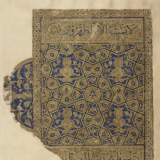History of surah The Cloaked One

Name
It received this name because God Almighty called his messenger Al-Muddaththir in the beginning
Period of Revelation
Surat Al-Muddathir was revealed to the Messenger of God - may God bless him and grant him peace - when he was on his way back from the cave of Hira after being there for a month. Surah Al-Muddaththir is a Meccan Surah and consists of 56 verses.
In the justification for the revelation of verses 1 to 7 of Surah Al-Muddathir, it says that the Messenger of God withdrew to the cave of Hira for a month. After the month had passed, he descended from the cave and when he reached the valley, he heard a herald calling for him. So he turned around and checked the directions around him and saw no one, then another call came to him. He saw no one, may God bless him and grant him peace, and the third time he heard the call, he looked up and saw Gabriel - peace be upon him - floating on a throne in the air, whereupon he trembled violently and rushed to his wife Khadija, may God be pleased with her.
It was reported that verses 11 to 30 of Surat Al-Muddathir were revealed about Al-Walid Ibn Al-Mughirah. In the hadith, Al-Walid Ibn Al-Mughirah came to the Messenger of God - God's prayers and peace be upon him - and the Messenger, God's prayers and peace be upon him, read to him something from the Book of God Almighty.
It was said: as if that softened his heart, and when the news reached Abu Jahl, Al-Walid came and told him that people wanted to collect money for him, but he refused, so Abu Jahl asked him to say ugly words in the Holy Qur'an and to say that he hated it, then Al-Walid explained what was in his heart towards the Holy Qur'an, and he admitted that it is neither human language nor poetry
Theme and topics
The Surat Al-Muddaththir contains many topics, including the following:
Honoring God's Messenger - God's prayers and peace be upon him - and commanding him to invoke God - the Almighty - and convey His message.
The injunction to worship God Almighty alone and to abandon and reject idolatry.
The call to be patient and more alms.
The proof of the resurrection and the warning to the polytheists to deny it.
The description of the day of resurrection and the description of the horrors of hell.
The contrast between the state of the believers who perform the prayer and zakat and the state of the polytheists who denied the resurrection and did not believe in it and underestimated hell and the number of its guards.